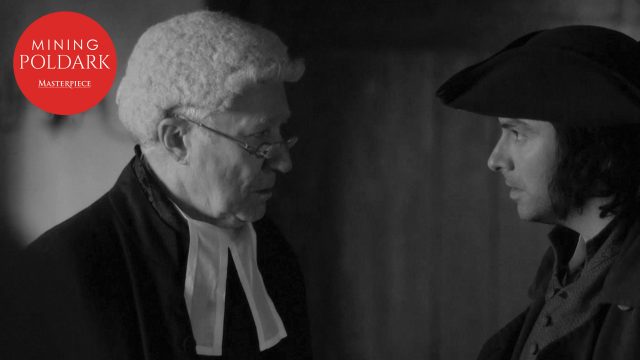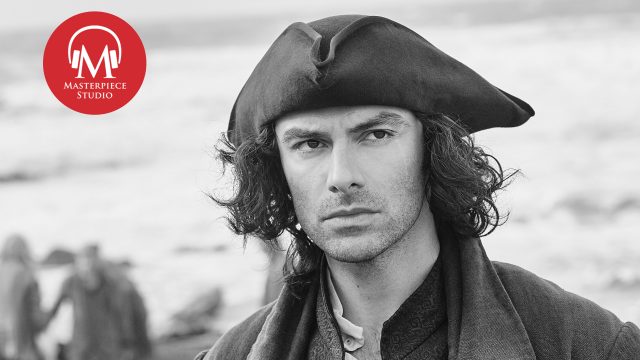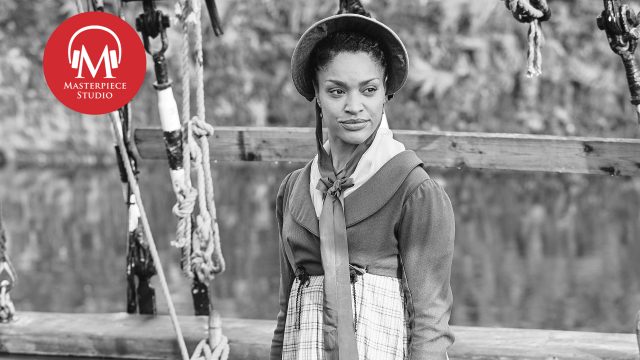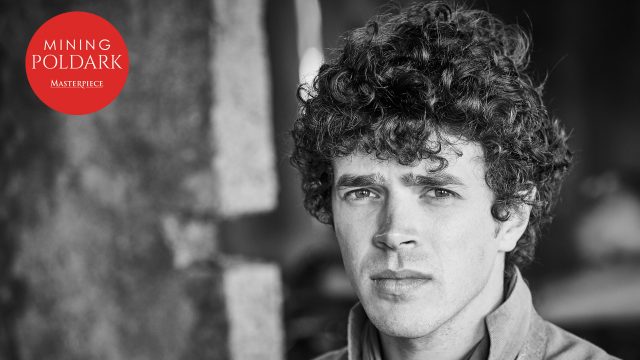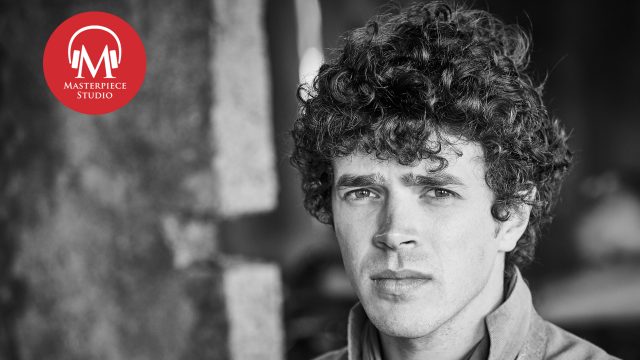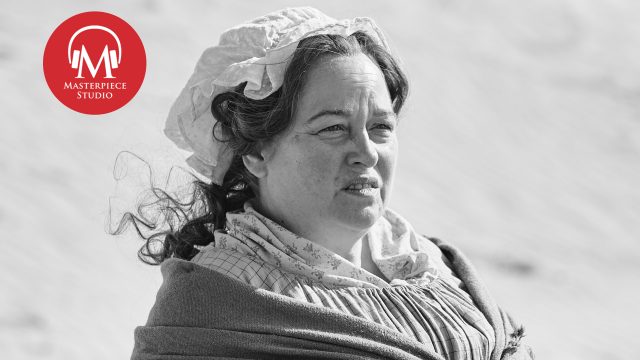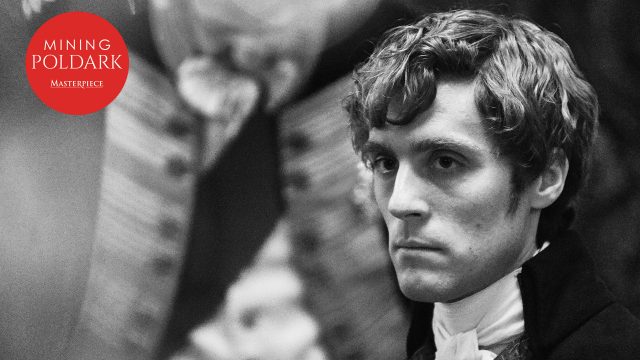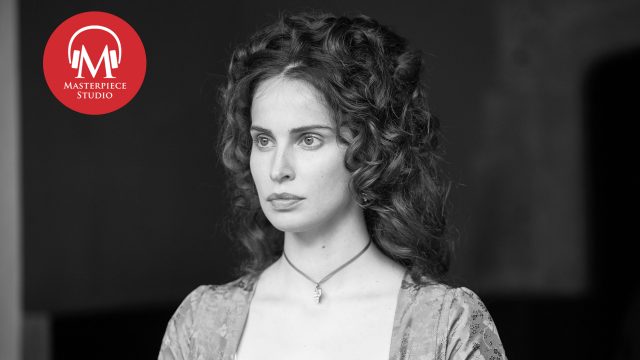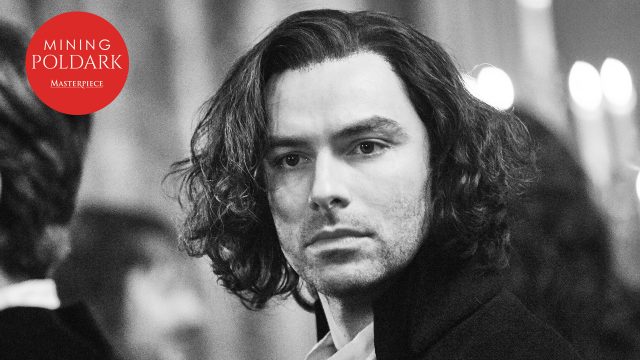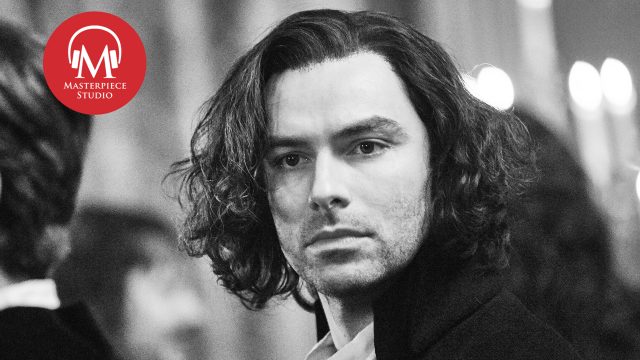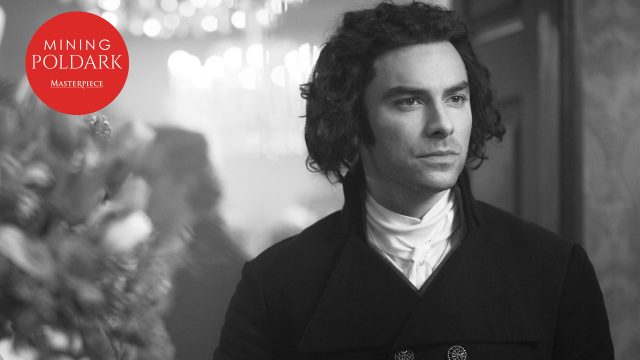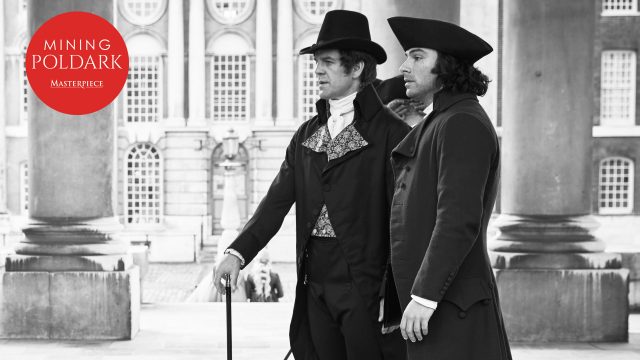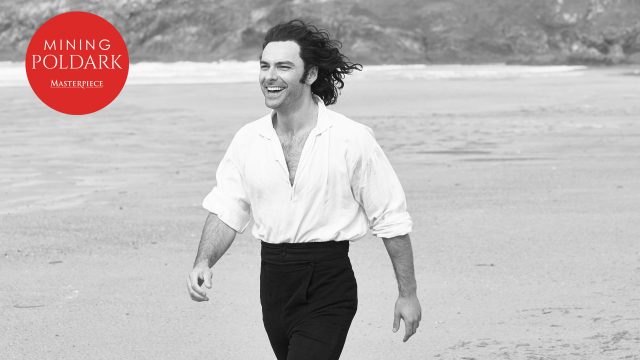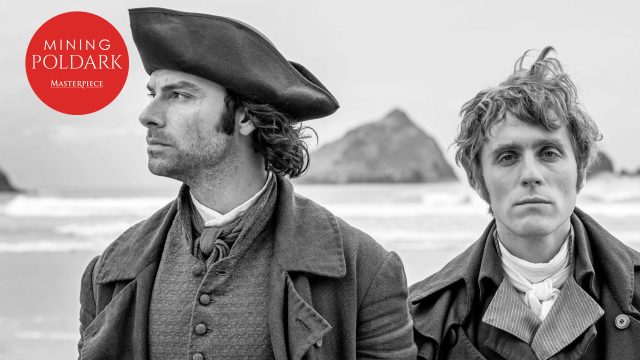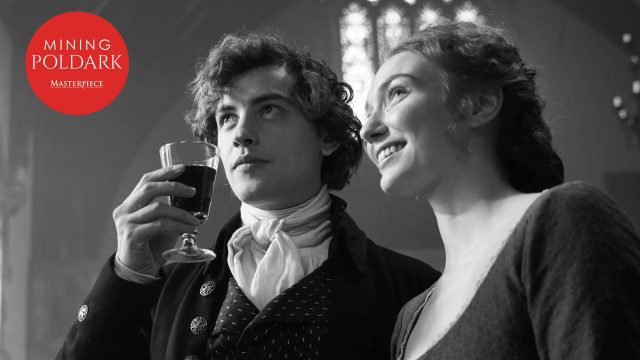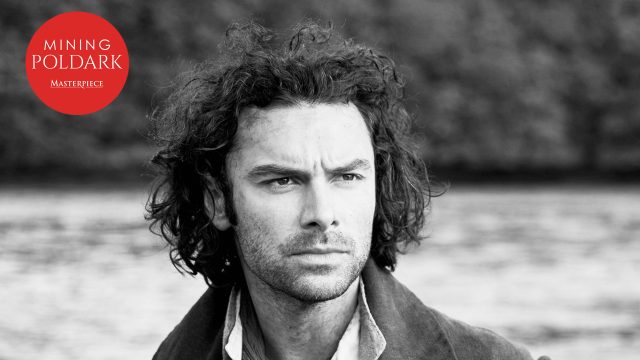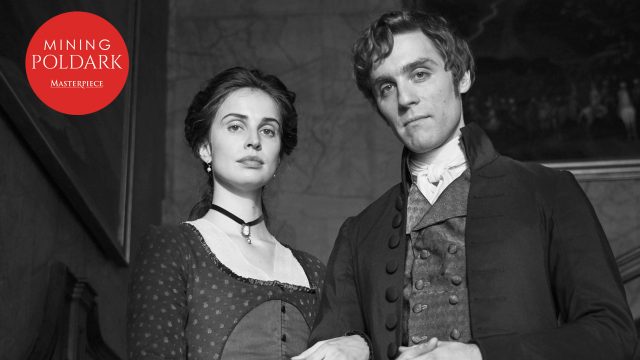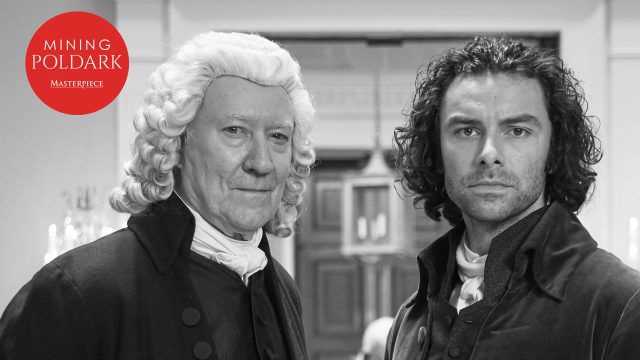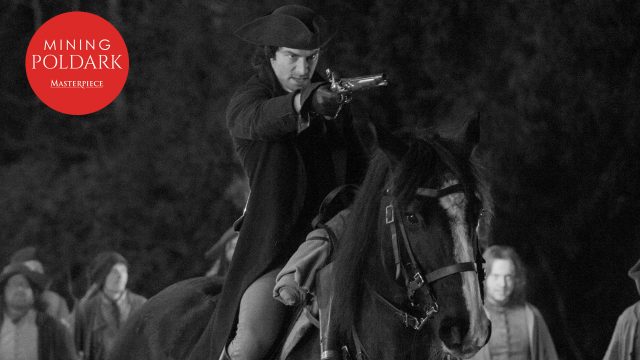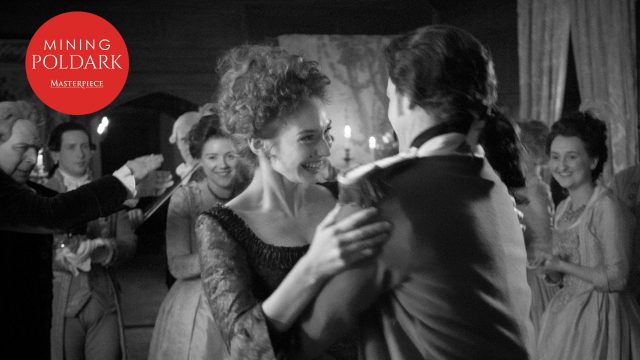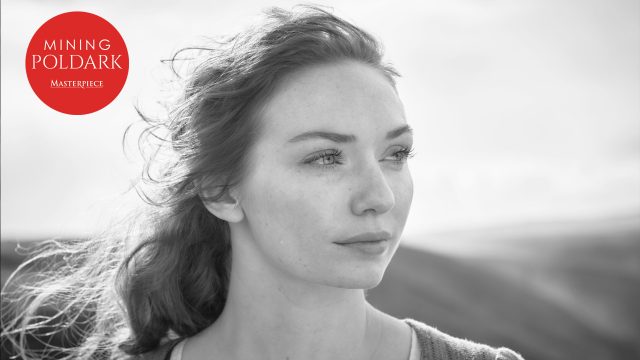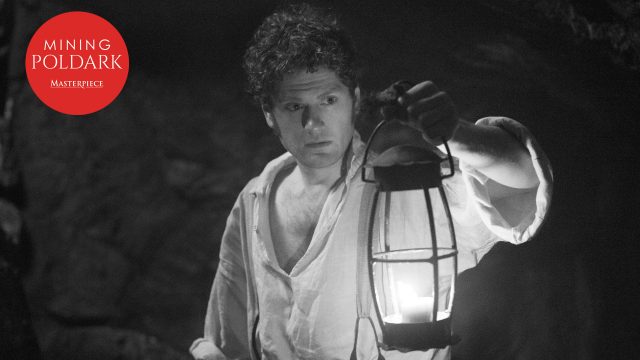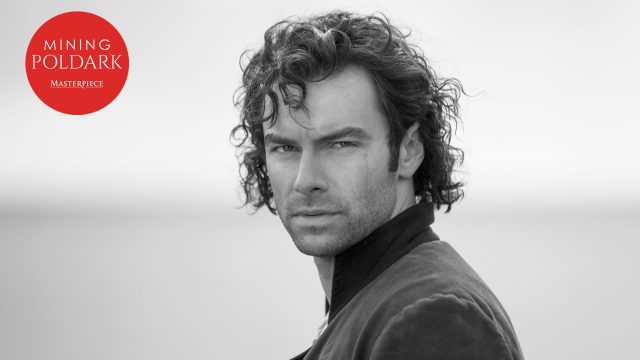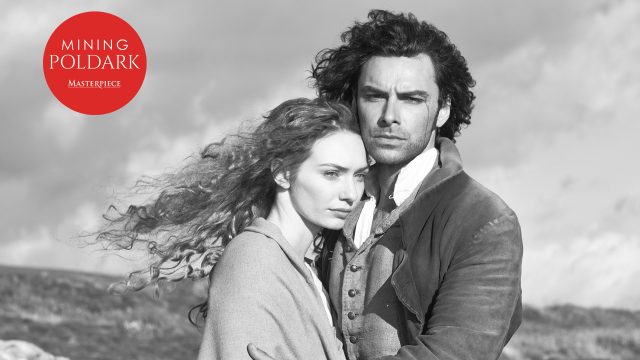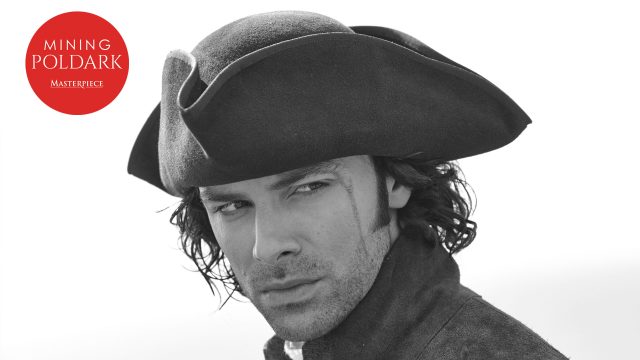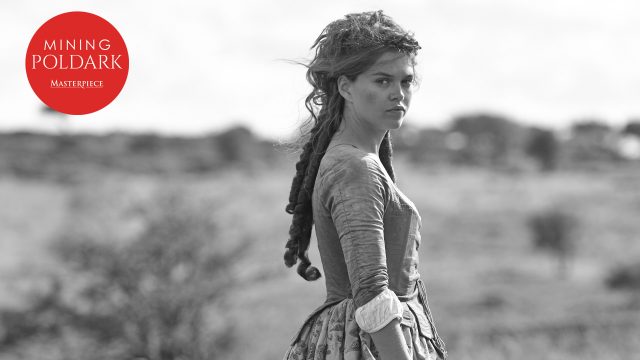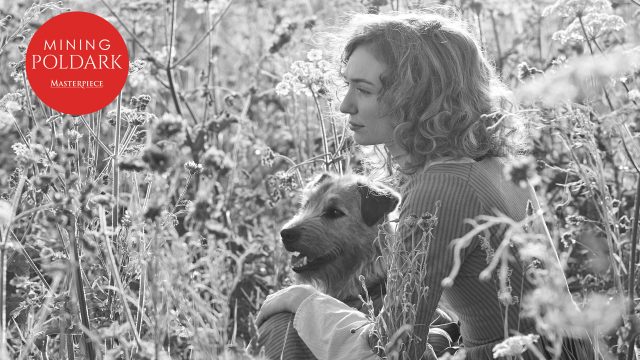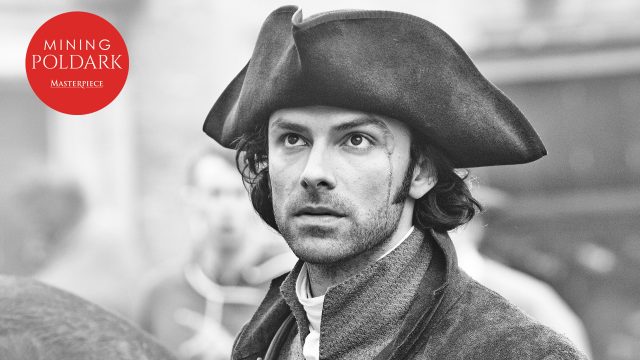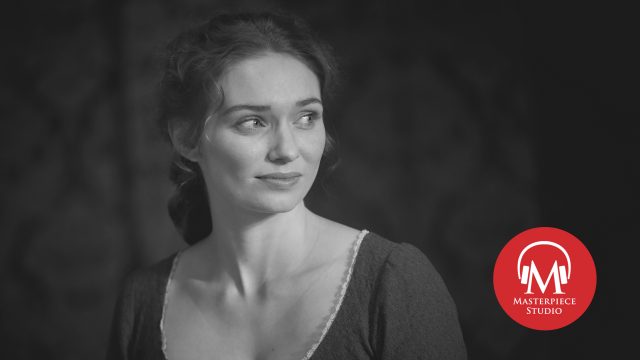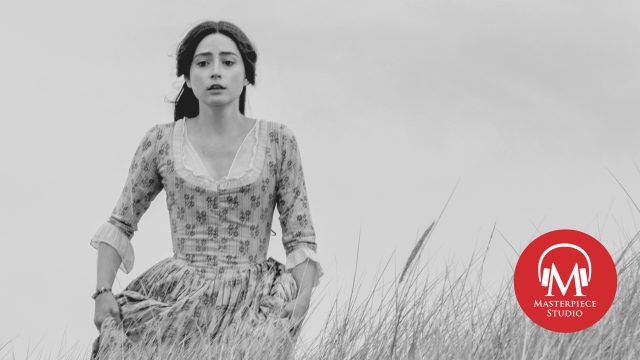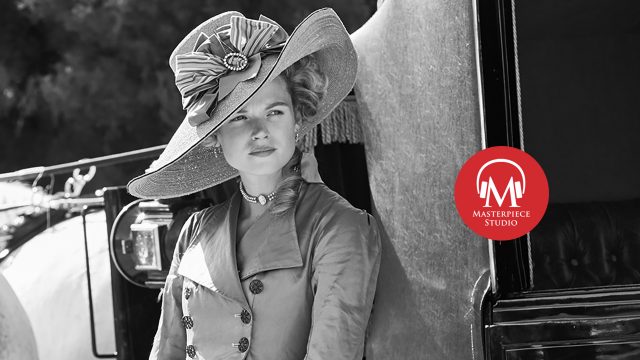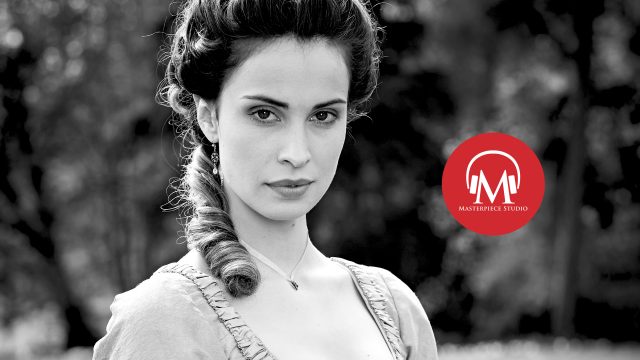While nobody in Cornwall seems to necessarily enjoy the company of one George Warleggan, even fewer appreciate his nasty uncle, Cary. As the sneering devil on George’s shoulder, Cary pushes George to be his worst self. So it’s a special treat to hear the care and thought that actor Pip Torrens puts into his icy portrayal of Cary Warleggan. He joins us to talk wigs, Cornish accents and how it feels to play an out-and-out bad guy.


Pip Torrens’ Uncle Cary Is The Devil On George Warleggan’s Shoulder
Released
Related to: Poldark, Season 4
Download and subscribe on: iTunes | Spotify| RadioPublic
Transcript
Jace Lacob: I’m Jace Lacob, and you’re listening to MASTERPIECE Studio.
In the late 18th Century Cornwall of MASTERPIECE’s Poldark, moral clarity can be hard to come by. But one moral certainty stands high above all else: Cary Warleggan is a jerk.
CLIP
Cary Warleggan: Gentlemen. I propose Mr. George Warleggan. An experienced candidate who has served this borough faithfully for many years. A banker and merchant, with a thoroguh knowledge of local affairs. a magistrate. A keen upholder of the law, which puts him in stark contrast to his opponent who has frequently shown himself to be above the law.
Jace: His nephew, George, comes in a close second in the race for the rudest member of the upstart Cornish nouveau-riche, but it’s Uncle Cary who always takes the crown.
CLIP
George: Now, if Natt Pierce could oblige us further and kindly bite the dust…
Cary: So we may hasten the demise of Pascoe’s Bank.
George: And with the Poldark nest egg.
Jace: Pip Torrens is a remarkably busy character actor, popping up here, there, and almost everywhere to play everybody from Amanda Kendall’s snooty father, Sir Edward, in MASTERPIECE’s Grantchester to the truly villainous Herr Starr on AMC’s Preacher. But playing Cary Warleggan remains a special treat.
Pip Torrens: He’s a man of principle. He is someone who just goes on looking to crush his opponents.
Jace: Torrens joins us to discuss the unique joys of playing an unquestionably bad guy, the challenges of finding an authentic Cornish period accent, and how Uncle Cary can’t help but be George’s worst influence.
Jace: This week we are joined by Poldark star Pip Torrens. Welcome.
Pip: Thank you.
Jace: What did you make of Cary Warleggan when you first read the scripts for season one of Poldark?
Pip: I thought he was a fascinating character, I mean, as you probably know, he is actually a combination of two. Because George originally has in the books he has a father and an uncle, and they are slightly different characters and the uncle is the more villainous of the two, while the father still has a conscience. And I think in the 1970’s production, the Robin Ellis one, they did do that, they did separate the characters. So Cary is a combination, he has some vestiges of conscience, particularly when George makes moves which surprise him, which is happening more and more. But he is, at least he was, in the early days, clearly, you know, a few steps out of the blacksmith shop and deeply resentful of the people who regarded themselves as his superiors. So that was his motivating anger if you like, and the fact that George could be seen very much as his protege, and someone who was going to do all the things that Cary couldn’t have done, even if Cary professes a kind of cynicism about society and class.
Jace: You mentioned the blacksmith forge. George is definitely motivated much of the time by his feelings of inadequacy, particularly the fact that he’s the grandson of a blacksmith. How much of that familial shame is similarly felt by Cary?
Pip: I think if there’s any shame felt, it’s very well covered. I think he’s a man of confidence and because he has acquired enough wealth to be comfortable himself, he feels that at his time of life, no need for the kind of social aspirations that George has. So no, he’s older and he looks down on Ross and Francis and these people as just sort of flibbertigibbets. And also from the other side of the tracks. And he’s he’s happy to be on his side. He’s you know, he’s made his security.
Jace: What’s interesting to me is that George has become a sort of proper English gentleman. He looks the part, and more importantly, he sounds the part, whereas Cary has held on to his natural Cornish accent. Does that accent underpin the class distinctions between uncle and nephew?
Pip: I think it does, yes. And it’s fun sometimes. I want my accent to be noticeable without being extreme. And you’re right, there’s a very interesting divide in the show. I mean Demelza, for example, has her accent and she keeps to that. And that’s important because she’s a local girl and Ross sort of rescued her from what might have been a terrible life otherwise. But yes it’s always there. And I’d like to think that the way that Jack and I like to play it is, you know, that Cary does grate on George sometimes. It’s so beautifully written by Debbie Horsfield that she she puts in scenes where you know, Cary’s needling George a bit about, you know, his pretensions. And you know, and therefore tacitly reminding him where he’s come from.
Jace: How difficult is it to achieve and maintain that perfect Cornish accent?
Pip: Well that presupposes that I am capable of a perfect Cornish accent. I think I try not to think about the perfection of the accent because I think also that Cary probably isn’t speaking unadulterated pure Cornish, that he is he has sort of progressed a little way, but it’s something you need to look at and work at and maybe change a few words. Talk to the writers, talk to the script consultant and see what they think. I try not to overdo it. That’s was my note to myself. And he’s a growler, Cary, he’s a lurker and a growler. So I just trying to sort of visualize him as doing those things and have it come out in the quality of the voice rather than thinking about the actual specifics of the accent.
Jace: Is that his primary motivation within the series, to sort of scheme? Is he a constant schemer?
Pip: Oh yeah he’s a schemer, and he’s very happy with the way the Warleggan Bank evolves through the series into into become a kind of powerhouse. I think his his wariness is about George getting in to politics too much. Cary is interested in power, but I don’t think he’s interested in political power — specifically he’s interested in just social power, financial power is what it comes down to.
Jace: Early on in the series, George censures Cary for daring to talk about business at a wedding.
CLIP
Cary: Perhaps I should have purchased her for you, nephew
George: I broker my own business these days.
Cary: Well she’ll be wasted here. These Poldarks have nothing beyond the name. Mine on its knees, and mortgaged to the hilt. Warleggan’s Bank may send in the bailiffs as and when it chooses.
George: This is elegant talk for a wedding, Uncle.
Cary: Talk of a profit is always elegant, George.
Jace: Does that statement ultimately capture Cary as a whole?
Pip: It does absolutely, because it goes back to what I was saying about him just being interested in power whatever form it takes. So he is almost saying to George, ‘I’m not talking business, I’m just talking profit. If there’s any way I can think or make money out of something by shafting someone, then I will. I don’t think of it as business. I think of it as just, you know acquisition.’
Jace: George and Cary are characters that we love to hate. Why do you feel that they make such perfect allies?
Pip: They have a kind of bickering thing going, I think, or there’s a nice disconnect between them so that although you know as I’ve said Cary regards George as protege, for George to go on and get what George wants, he has to acquire many of the characteristics of people that they both despise. Although George despises these people less and less as he is he becomes one of them, you know, he meets the great Lords and politicians of the age. And I think what’s been really enjoyable and what’s so great to be acting with Jack Farthing, who’s just so clever and nuanced in his performance is that we get lovely little sort of notes between us about how yeah, we’re on the same side, but we don’t necessarily agree on the way things should proceed. And I think that’s that’s something that’s been really nicely developed and allowed to grow by by Debbie Horsfield.
Jace: Do you see Cary as the devil sitting on George’s shoulder?
Pip: Slightly, yes. And in the original books as Debbie described it to me, it was Cary’s character was very much the bad angel on one shoulder, whereas the father, George’s father, was was rather more reasonable. So yeah, no, I like that he’s he’s the devil’s advocate in any situation. But what’s interesting is increasingly you see situations where George outdoes the devil’s advocate. So I don’t know what the you know the simile would be. He becomes the you know, the pupil becomes the teacher.
Jace: What’s interesting to me is that George at his heart is a very emotional character. He’s often motivated entirely by emotion or slight. Do you see Cary as being sort of the colder more ruthless of the two?
Pip: Yes, I think that’s absolutely right. And of course that raises questions for you as an actor because you know you think well OK, I don’t want him to be one note. I get that he’s relentless. But you would like to know whether Cary had an emotional life, whether there was a Mrs. Cary Warleggan And if so what happened to her. And I had a kind of joking suggestion last season with Mrs. Chynoweth, who is Elizabeth’s mother, has a terrible incapacitating injury and becomes bedridden, and I half joked to people that she was the ideal wife for Cary. He could just sit her on the sofa next to his his dog and sort of ask her advice, knowing that she wouldn’t say anything, but I think that would have been too humorous. But it’s tempting to think that something in his history that explains quite why he’s turned out the way he has. But there’s no point in belaboring it, really. I mean I think I think the real the interest is, as you say, following George’s emotional journey and watching Cary watching George.
Jace: I mean he does some pretty terrible things over the course of the series — he shrugs off the death of Ross’s daughter as just sort of nothing, he nearly turns Francis and his family out of Trenwith when he demands that the full debt be repaid immediately. I mean, what do you make of his actions — are they in any way defensible?
Pip: Well I suppose the immediate defense to the first one would be yeah, he’s being horrible about Ross and Demelza, but infant mortality in those days was an absolute given. I mean, if you read about American history at the same time, and you know there’d be epidemics which would wipe out whole families and equally, you know, childbirth was very, very fraught with danger. And also the life of a child in the first few years was was really much more hazardous than it is now. I mean, we know that, but you you read accounts of these men’s lives and women’s lives and you very often they you know, they’ve lost several children very early in their lives and that’d be a shocking thing to happen. So you know, we don’t have time in Poldark to show this on on a wider scale, you know, the 18th century. But certainly it wouldn’t have been as shocking a loss as it would be now. But of course, he’s a cruel man and he will just make a remark to that effect. And yes. And in terms of turning them out of Trenwith, and that’s just too delicious a prospect for him not to have a go at.
Jace: I mean it’s said that every villain is a hero in their own story. Given Cary’s villainous behavior I mean, how would you paint Cary Warleggan in heroic terms?
Pip: Well he’s relentless as I’ve said. He’s he’s a man of principle. He is someone who just goes on looking to crush his opponents.
Jace: So he’s a determined futurist with good financial sense.
Pip: That’s beautifully expressed. I don’t think in those terms — they just grind on, these guys. I mean you know, that’s the point. The point about infant mortality side of things is that equally you know life was short and savage and you knew you could have an accident you could fall off your horse and die as a consequence from blood poisoning or whatever and this happened regularly as we know in those days. So yeah, I think he’s isn’t think of it as living for the moment but he’s just he is living in the present. I don’t think I don’t think he thinks about the past and I think he thinks about the future as just being more of the present more just getting what you need if necessary at the expense of other people.
Jace: Cary often walks off with some of the pithiest, most brutal lines on the show. My favorite is when George confides in him that Jeffrey Charles is getting uppity and Cary responds with two words: boarding school.
Pip: Absolutely.
Jace: What do you make of Cary’s dialogue?
Pip: I love it. I love it and I think Debbie probably loves writing those those bits because you know Cary often is in the background as a sort of looking cynical presence to George and Elizabeth. And yeah he sees things very clearly and he sees the boy as a nuisance and a distraction to George that he should be he should be packed off and also boarding school is a smart move it makes it would in those days have been a logical step to make this boy into a young gentleman, which to be fair, it does. So he’s he’s not wrong. Jeffrey Charles becomes an absolute charmer.
Jace: Another mark in his good book.
Pip: Yeah.
Jace: I loved the scene where Cary throws a tantrum after Ross pays off the promissory note with interest.
Pip: Yes.
Jace: And he sort of growls, you know, ‘What is this foolery?’ And, ‘We will bring him down if it takes 10 years!’
Pip: Yeah.
Jace: What was it like filming this scene?
Pip: Great. It was great to have an explosion like that because you rarely see it. And it’s beautifully shot. They come in looking very penitent and you know, to us, again, this is delicious. You know, we’re savoring this, if you remember we’re having a little little drink before they even arrive. We’re in such high spirits and then they come in and they nail it. And they did it so well. I remember they just came in looking really like you know they were really penitent and they’re going to throw themselves on, I’m saying we weren’t going to show any mercy and then bang! Down comes the note that Caroline has provided for them. And that’s it. So yeah. We’re absolutely livid.
Jace: In this week’s episode, Cary urges George to buy a seat so he can return to Westminster, now that Ross has taken his place. But he’s shocked when George tells him he intends to buy a borough instead. Why is Cary so opposed to this specific plan?
Pip: That’s a good question and I’m not entirely sure I know the answer, except I think it’s probably an instinctive suspicion of diversification. So he he can sympathize with George wanting to be the man himself on the ground. But I think he’s less happy with George as a sort of patron of other MPs. But of course, that’s exactly how, you know, governmental business was done in those days. There was no, you know, obviously we know there was no universal franchise at all. And we see a lot in this series which I personally found very interesting about how party politics was conducted in the regions and then in Westminster at the time I think. But then again I think also part of him feels that George is moving too fast and that he will have a situation that he perhaps can’t keep control of. Or perhaps it’s simply that Cary just doesn’t do politics in that way. And so it’s an interesting point. I think George has ambition. We see this a few times George’s ambition actually outstrips Cary’s.
CLIP
Elizabeth: Your uncle thinks the bid extravagant.
George: Oh he would, he’s a blacksmith’s son. And I, a blacksmith’s grandson, and had thought my lack of pedigree well buried til two members of the ruling elite saw fit to close ranks against me.
Jace: Are we finally seeing cracks forming between Cary and George here?
Pip: Yes I think quite possibly we are. However you know you would have to say those are cracks which can easily be covered over or can be. They would not want to grow. Neither of them would want those cracks to grow too wide. I mean I think George although Cary you know plays up you know feeding his dog at the wedding parties and just being very cynical about everything. I don’t think George wants to lose Cary. And I think he you know he’s not about to sort of reject him completely given how many projects he seem to be juggling and wants.
Jace: What is your typical schedule on Poldark to shoot all of your scenes back to back over a week or is it spread out across a few months?
Pip: Well I mean the only sadness for me involving Poldark is that I I got the show and it was the first sort of nice long running show I’d had for some time. And then shortly after getting Poldark I also got on to a French show called Versailles which involve two seasons shooting that which was great I loved. And then in the middle of Versailles I got my part in The Crown. So after you know 35 years of scrabbling together all day or two on TV show I was kind of spoilt for choice but that’s because like a lot of actors you know streaming streams drama kind of came to my rescue along with the move away from reality shows into proper drama which is why you know you can’t move the film actors moving into 10 hour dramas which is fantastic everyone’s very happy about that. But it’s sad when one show necessarily takes precedence over another and The Crown as I actually had to say does take precedence didn’t present so that pushed my my contribution to Poldark slightly into the background which is why I’m very excited about season five is that we should get a clear run at that. But yes I mean all my stuff for this season I actually did in November of last year because I was by that point involved with Patrick Melrose, the Sky Atlantic show with Benedict Cumberbatch which is just also come out and he’s doing very well. So I managed to do all my lurking and sneering in in November but my only beef is I never get to go down to Cornwall because I’m always in a drawing room somewhere counting money which I’d rather be out of in a whole scalloping lower cliffs so that’s if they’re listening that’s what I would like, really.
Jace: I mean, do you ever wake up on a Monday and have to think to yourself, ‘Who am I this week?’
Pip: Yeah, not really, not really. It’s OK. I jokingly say that in fact I’m basically playing the same part in different wigs.
Jace: Before this next question, a quick word from our sponsors…
Viking. Viking’s new ocean fleet is designed with all veranda staterooms for just nine hundred thirty like-minded guests. By River and by Sea. More at Viking Cruises dot com
Jace: Looking back at your time on Poldark thus far. Do you have a favorite scene or episode?
Pip: Oh I kind of, yes. There was a wonderful scene. I think it was season one or two where they just — and I felt they just pushed it with Cary a bit where I think we were entertaining Mrs Chynoweth. And I think George is just schmoozing her. It was before he I think started his formal courtship of Elizabeth. But she was rather taken with them were all sitting in the drawing room and there are four of us because I think I’ve remembered this right, it was George Sally Dexter who plays Mrs. Chynoweth earth and me and my dog who was sitting next to me as if the dog was a sort of fourth member of the party. I think I’ve remembered this right. Basically I love my dog. And I love it and the dog is just in the drawing room with no other comment because the dog just goes with Cary wherever he goes. So any scenes with my dog, Satan. I absolutely love.
Jace: Satan.
Pip: I can’t remember if he’s called Satan, that he’s officially called Satan but I want him to be called Satan anyway, so I love that. And I love big scenes. I loved all the scenes with the hustings the political stuff as I said and great you know and also to see Robin Ellis, who plays Dr. Hulce who’s just it’s just so wonderful that he’s in this production as well. And I think he’s having a really good time and they give him wonderful scenes to do. And you see a lovely nuanced development his relationship with Ross having been Ross kind of nemesis in season one. Things move on. That’s the great thing about Poldark. You know, characters grow and they understand they have to maintain relationships with people in the community and some wonderful stuff between Robin and Aiden in this season where they’re sort of understanding that they need to get along you know. So I love being part of those ensemble scenes even if we just sort of you know working out how we can shaft everyone in the room.
Jace: I printed out your CV and it was six pages long.
Pip: Okay.
Jace: Which is astonishing to me. To what do you describe your vast and varied career?
Pip: Very lucky. And having been very, very well represented over the years by hungry agents who’d go looking for me and would gather up work that would then lead to other work. Someone said to me very early on the best job is the one that gets you the next job, that should be your only real criterion for taking something, and with television that’s proved to be the case. And you know there’s a sort of if you sound like me there’s a kind of progression at home from sort of nice public school parts into establishment parts, lawyers, soldiers, doctors. I’ve done a lot of all those. And then as I said it got very scary a few years ago when drama appeared to have evaporated. And then you know from the American model of The Sopranos, The West Wing and the writers room culture came this sort of resurgence that I think was enabled by the internet and all the intelligent writing moved into television and then that becomes extremely attractive and it means that you commit to a project and the project is 10 or 13 hours of drama which means that you have then an audience who are extraordinarily literate and well-informed about what they’ve seen because they’ve seen so much of it. And also you don’t want your 10 hour show and then say ho hum I’m not quite sure what I thought what a attend hour show and chances are you love it or you wouldn’t watch more than one or two. So I’ve been lucky as they say really, really lucky. You just keep going. And I think just you have to have an incredibly good reason for turning something down. I mean you know I have to I would have to have sort of four or five ticks against something to turn it down. And I just would never turn anything down. I remember hearing a story about Jack Nicholson at a dinner party years ago. Some younger actor was there saying what they turned down and they turned down some quite bad stuff since they want to do this. But it wasn’t right. I didn’t want this. And then Jack Nicholson wasn’t saying anything, and someone said. ‘What do you think?’ Jack Nicholson just said, ‘I don’t understand and he said when I was starting out I didn’t turn down a single thing. I would never turn something down,’ you know. You could argue was a slightly different time but I think the principle’s good. You know, it worries me when you even now you what occasion you see who turned things down. Sometimes the story gets out years of the event. Who was up to this who was up for that. And you tend only to hear about the the major projects that went very well for the person who got it. But even so you know now it’s a very precarious life. And you know even now you meet you know I would meet when I wasn’t doing so well I’d meet contemporaries who were doing you know off the charts well. And you know it becomes of the household names. And there’s a kind of terror that comes with that. Because if you’re a household name, the chance you’re doing very big projects and you’re identified very strongly with the brand. And if then you’re involved with something that doesn’t do well you’re slightly tainted by that potentially. So you want to move on to the next humongous thing to take care of that was if you’re working character actor which is basically what I became. You are attached to different projects and if you do well and you’re two or three scenes that’s great. And if you if or if it does well then you get the credit for your two scenes. But equally if the if the overall project isn’t well received it doesn’t tend to reflect on you so much. You can move on. So I always said I was very happy that I was doing I just wanted to increase the volume you know sort of three days every three months. I’d like to do three days every week.
Jace: You mentioned the phrase character actor. Do you wear that moniker comfortably?
Pip: Everybody is a character actor and increasingly really, everybody is a character actor. And if you look at the TV stuff we’ve been describing then that’s it’s all about character, it’s all about having the time to develop a real character. I mean often, and I don’t know about you but sometimes, you know, you go to movies now and they’re great in all sorts of ways and you love them. But sometimes you’re thinking about them often and you think I’m so great that we didn’t see more of so-and-so or we didn’t see or you know that great actress I’ve always admired popped up in a role they’ve been edited out or you know there just wasn’t time and the different there are different priorities at work. And it’s nice to see performances in more detail.
Jace: One of my favorites of your comedic performances is as Bingo Little.
Pip: Oh yeah, yeah.
Jace: In Jeeves and Wooster.
Pip: Yeah.
Jace: What was it like working with Hugh Laurie and Stephen Fry on that?
Pip: Well they are absolutely just as lovely as you would imagine. I knew them both. I knew them both slightly because we were at Cambridge University the same time and I was always getting compared to Hugh because vocally were quite simple vocal were quite similar vocally anyway. The first thing that happened was that Stephen, whom I hadn’t seen for a number of years, came over on my very first morning and said hello, and how lovely it was to see me and how nice it was to have me on the show and everything and you know that’s just priceless. When somebody does that it’s just lovely. And they were great. They’re very funny. They’d been doing it for a while by then and you know it just fitted them like a glove. I still think I was one of the most inspired you know combinations and pieces of casting in British TV and you watch those those shows again and they’re great but then you know Woodhouse is a genius, genius writer and I think probably quite easy to adapt because there’s so much fun it’s so silly that always capers you read the Woodhouse books and you know if you like them you’ll be laughing out loud even now you know it’s just he gets the ridiculousness of life really well. And he he’s very good on puncturing you know pretentiousness which is important.
Jace: For the first few seasons of Netflix’s The Crown you played adviser Tommy Lascelles. What did you make of Tommy as a character one that a website referred to as quote The Crown’s best character.
Pip: Oh that’s very sweet. I mean I think well Peter Morgan is a genius writer. I would say that and it’s a great part and I think Peter realised that Tommy was a very good way of conveying or helping convey the viewer through some of the sort of trickier political dilemmas and social dilemmas that Elizabeth faces and Tommy did do that. I think Peter amplified his role and I know he wrote more me into season two than he was going to and I think that was to help him as much as anything else because a lot of the time with those Tommy scenes you find that he’s come in to tell to explain some point of protocol etiquette or or political convention to Elizabeth who’s very young of course was very young when she she came to it. So that’s a good way of briefing the audience on where we are and why these things are important. But also he’s the most fascinating man. And he he he’s just type that even then I think the very fuel. So he’s a kind of classic Edwardian. He had his dates 1887 to 1981. So he lived to be 94. And one of the last things that happened in his life was he watched the fireworks for Charles and Diana’s engagement from the window of his apartment his sort of grace and favor apartment that he was given at Kensington Palace. But he’d started you know he was born well into the reign of Queen Victoria and he wrote three volumes of absolutely beautifully written diaries which showed that he could have been a very good writer in his own right. And he writes about fishing and hunting and things which even if it’s not your cup of tea that they’re very well written you know prose poems almost some of them. And he kept the secrets. So just when you want him to start really dishing the dirt he stops and the most indiscreet he ever is is in the early diaries where he’s he’s he became part of the travelling household of the Prince of Wales as he then was he went on to become Edward the eighth the guy who abdicated. And it’s fascinating to read it’s like reading someone being on tour with Justin Bieber or someone like that now because it starts off great and all the letters and diary entries are you know I think the Prince of Wales as you know he’s this very vital attractive man and it’s going to be great working with him and then they get sent off on these very long tours of the Commonwealth to sort of boost the image of the monarchy it was quite a sort of modern idea. And of course the trouble with that is everyone got bored fairly quickly and this meant that David as he was known would just go off the rails he’d drink and he would turn up late or he’d be rude when he shouldn’t be or he’d typically seduce people’s wives just because he could. And you know it drove them all mad. And the letters between the various members of the household get more and more kind of frazzled and there are letters saying things like you tell me you’re going to retire at the end of this tour please don’t this. We had agreed that I would retire then you would retire next year because none of them could stand him and at the end of it he actually how to rage with the Prince of Wales and told him he was behaving really badly and had been for years and that and David apparently said you’re right. You know I just I probably shouldn’t be king. You know this is going to be disaster I know and several people have said that which makes it fascinating leading up to them. What we know about the abdication because we don’t know at least we don’t know enough because told me even though he was back in the royal household he’d gone to Canada and then come back 1935 he came in back in Georgia and died I think three weeks later. But there’s not a word in the diaries of what happened in 1936 which was the absolute key point. And what happened in 1936 that informs Tommy’s attitude to how the monarchy has to be run you know in the during the war which it ran very well and did you know got a lot of popularity. But then with Elizabeth as well and how she needs to be run. So he’s a great character and he just want to know more and more about him. I just hope there are sort of classified papers of his that will be declassified at some point in the future.
Jace: You mentioned wigs, and you excel at wig and mustache work.
Pip: Thank you.
Jace: Never more so I’d say that is Tommy Lascelles, he of the beautiful moustache.
Pip: Yes.
Jace: What did you make of Tommy’s mustache, which is as much an identifier for this character that Philip even refers to Tommy and Michael Dean as the moustache?
Pip: Yes, yes they do. Well I had a very luscious mustache in this which I think is perhaps more if you look at the original Pitchess told me he’s slightly more military looking and the mustache is quite finely trimmed. But another story is very important. You’re right as a motif because of course at this point the only men who wore mustaches are the men who’d been growing them, you know, when everyone had mustaches at the beginning of the twentieth century. You know during the first World War. So it is very symbolic and it’s a very again that’s shows you how clever Peter is that he thought that some as a way that Philip would have of of you know describing these enemies that he had in the establishment. And the week was fantastic. Peter Owen wig, Peter Owen the great wig maker. Yvonne Richards, the makeup artist and the hairdressing design is just brilliant. And I’ve worked with her before so we had a lot of fun with the wig and what the wig said about Tommy and how he was very precise and very neat and you know everything was just right. We had a very wonderful royal expert, Major David Rankin Hunt on the show who had actually met Tommy Lascelles towards the end of Tommy’s life and said How peculiar he was and how he liked to speak in a particularly sort of arcane way and used phrases that really nobody could do since the 1890s. But yeah. So he was an absolute gift from that point of it’s a very very interesting man quite a cryptic man man who enjoy like having secrets but like the power of not revealing things which is a very old fashioned virtue I suppose you think now. We like to think we know everything everything’s out that but yeah he had a lot of style I think and as I say his diary entries and some of his letters you know when he lets himself go. He’s very entertaining. I think he would be a fascinating dinner companion although he would have probably played you like a fish.
Jace: Season three of the Crown is bringing in Olivia Coleman, Helena Bonham Carter and Tobias Menzies to play the three at the center. Any chance as you say since Tommy Lascelles died in 1981 at the age of 94 that you might be putting on prosthetics, too?
Pip: Believe me I was. I’ve been I’ve had people laugh in my face several times. As I pitched this I pitched it to Will Kene, who plays Michael Adeane, was in the corridor and barking in the back Impalas and he sort of started laughing but he said no I know what you mean. My argument was if I had an argument it would be that kind of like vampires anyway. But I think if you look at I mean, Michael Adeane served for 20 years and he went on for a long time. He got very close to Elizabeth I think. But yeah. I you know I thought yeah fine you recall you bring in Tobias and that and that. That will be fun. They’re all amazing very talented performers. They’re going to bring something really terrific. Each of them. But you know I said this to one of the producers, Suzanne Mackey, and she said no we’ve had this conversation, she said. Believe me we’ve had every version of the conversation. I’m one of them was maybe we keep some of the household. They’re the ones who go on and on. They’re the true believers. You know you wouldn’t necessarily you’re going to see them again. You going to meet those characters again you wouldn’t necessarily need to recast them. So but you know in real life told me it’s pretty much faded away. He was very happy to retire and go into sort of just being one of the great and the good. I mean he went on and he he was on lots of boards of things he was on the board at the London Library which is a wonderful library, St. James’s Square in London and he was on the board of the society for the preservation of ancient buildings which I think still exists. Preservation of protection of ancient buildings. And he he was very happily married for years to Joan. And you know he grew roses and and sort of went away so I don’t think he was probably ever really called in again. But he did have one after his wife died. He went back and had one of these grace and favor apartments in St James’s Palace. That’s where the story about Princess Margaret comes from. You probably know this one that much later in life she was being driven back into Kensington Palace and she saw this old figure hobbling along in the distance and realized it was TommyLascelles, then aged probably about 85. And she told her driver to speed up said that he might he might be able to run Tommy down. She said, ‘That’s the man who ruined my life. Speed up let’s see if we can hit him.’ I mean she’d probably just come back from a big lunch with all slightly the worse for wear.
Jace: Finally, what’s next for you?
Pip: Well I’m just I’m I haven’t seen it yet but I want to catch up with Patrick Melrose. That’s just been out and that’s had pretty good reviews so doing that. And then I have a small part in Deep State, the Mark Strong thing that’s just come out on Fox. I think and I’m hoping to go back and build that part a bit. Matthew Parkhill the writer-director has apparently built up the character a bit, more episodes of that and I’m doing a small part in a British television production of an Irish novel called Death and Nightingales that Jamie Dornan and Matthew Rhys and so I’ve got some nice scenes to do with Matthew for that and then season five of Poldark starts. So it’s it’s wall-to-wall villainy.
Jace: Pip Torrens, thank you so much.
Pip: Thank you, Jace, thank you very much.
Jace: When it comes to bad behavior, Pip Torrens’ Uncle Cary could learn a bit from the Reverend Ossie Whitworth. Far from a picture of Good Christian charity, the Reverend Whitworth is a regular monster of a man.
Christian Brassington: So I didn’t set out to be odious at all or to be evil or to be unpleasant. I just tried to commit as fully as possible…to what was in the script to what was asked of the character.
Jace: Actor Christian Brassington reveals the man behind the monster here on MASTERPIECE Studio next week.
MASTERPIECE Studio is hosted by me, Jace Lacob and produced by Nick Andersen. Elisheba Ittoop is our editor. Susanne Simpson is our executive producer. The executive producer of MASTERPIECE is Rebecca Eaton.
Sponsors for MASTERPIECE on PBS are Viking Cruises and The MASTERPIECE Trust.
Poldark Podcasts 68 More Podcasts
MASTERPIECE Newsletter
Sign up to get the latest news on your favorite dramas and mysteries, as well as exclusive content, video, sweepstakes and more.











